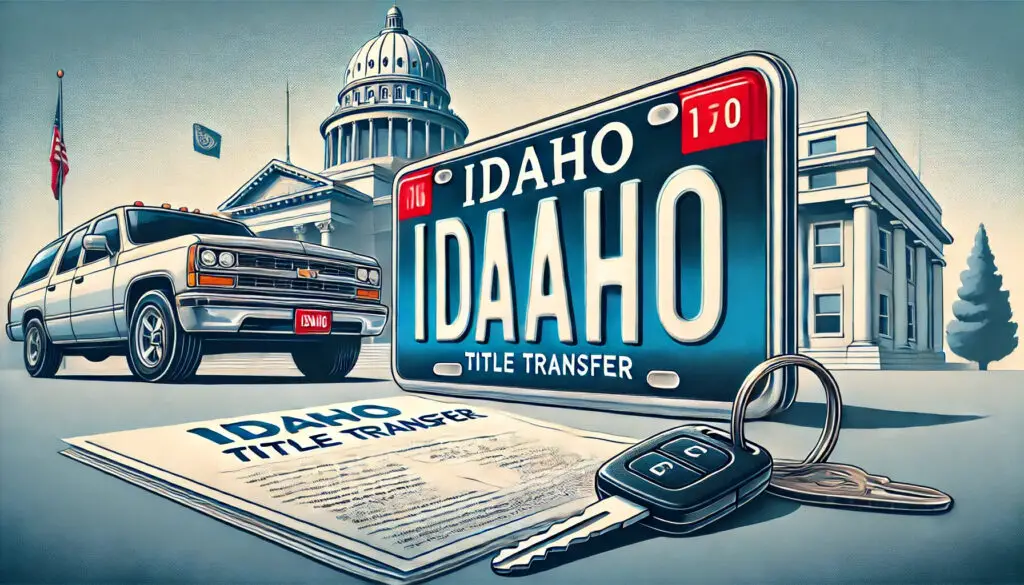What is Title Transfer and Why It Matters in Hawaii?
Title transfer in Hawaii refers to the legal process that changes the ownership of a vehicle from one individual or entity to another. This is an essential part of vehicle transactions, ensuring that the new owner is officially recognized by the state of Hawaii as the rightful possessor. Whether buying or selling a car, inheriting a vehicle, or transferring ownership due to a gift or divorce, understanding the title transfer process is crucial for all involved parties.
Overview of the Hawaii Title Transfer Process
The Hawaii title transfer process requires the seller to sign over the vehicle’s title to the buyer, who must then register the vehicle with the Hawaii Department of Customer Services (CSD). The buyer will need to gather necessary documentation, complete forms, pay fees, and submit the application. Upon approval, the CSD issues the new title and registration in the buyer’s name.
Why You Shouldn’t Skip Title Transfer in Hawaii
Skipping the title transfer can lead to a range of legal issues, including disputes over ownership, fines for improper registration, and potential liability for the vehicle’s actions. The title serves as official proof of ownership, and failing to transfer it properly could complicate matters when it comes time to sell or register the vehicle.
Understanding Title Transfer in Hawaii
What Is Title Transfer in the Context of Vehicle Ownership?
Title transfer is the formal process through which the ownership of a vehicle is passed from one party to another. This process involves the signing of the title by the seller, followed by the buyer submitting it to the Hawaii DMV, along with other required documentation, to complete the registration process.
Why Is Title Transfer Necessary in Hawaii?
In Hawaii, the title transfer process ensures that the vehicle’s ownership is correctly recorded, preventing future disputes or claims over the vehicle. It also ensures that the vehicle is properly registered, making it legal to operate within the state.
Common Scenarios Requiring Title Transfer in Hawaii
Several situations may require a title transfer:
- Buying or Selling a Vehicle: Both private and dealer transactions require title transfer.
- Inheritance: If you inherit a vehicle, you must transfer the title into your name.
- Divorce: In cases of asset division during divorce, vehicle ownership may be transferred.
- Gifting or Donating: When a vehicle is given as a gift or donation, the title must be transferred.
Who Needs to Transfer a Title in Hawaii?
Vehicle Buyers and Sellers
If you’re involved in buying or selling a vehicle in Hawaii, both parties must complete the title transfer process. The seller must sign the title over to the buyer, and the buyer must then register the vehicle under their name with the CSD.
Inheriting a Vehicle Title in Hawaii
If you inherit a vehicle in Hawaii, the title must be transferred into your name. You will need to provide proof of the inheritance, such as a will or probate documents.
Transferring Title After a Divorce
During divorce proceedings, vehicles are often considered property that needs to be divided. If one party is transferring ownership to the other, the title must be transferred to the recipient spouse.
Gifted and Donated Vehicles
If you are gifting or donating a vehicle, you are still required to transfer the title to the new owner. The process is similar to that of a sale, though different documentation may be required.
The Hawaii Title Transfer Process: A Step-by-Step Guide
Step 1: Gather the Required Documents
Before initiating the title transfer, ensure you have all the necessary documents:
- Proof of Identity and Residency: A valid government-issued ID and proof of Hawaii residency.
- Original Vehicle Title: The current title, signed by the seller.
- Odometer Disclosure: Required if the vehicle is less than 10 years old, detailing the mileage.
- Proof of VIN Inspection: This may be necessary if the vehicle was brought into Hawaii from another state.
Step 2: Complete the Title Transfer Form
The next step is to complete the title transfer form. This can be obtained from a local CSD office or online. Be sure to fill out the form accurately, providing details like the vehicle’s VIN, make, model, and odometer reading.
Step 3: Odometer Disclosure and Requirements
If the vehicle is less than 10 years old, the seller must provide the odometer reading to confirm the mileage. This is a legal requirement to prevent odometer fraud.
Step 4: Pay the Associated Title Transfer Fees
There are fees for title transfer, which vary depending on the vehicle type and registration status. Ensure you are aware of the exact fees involved, which can be paid online or at the CSD.
Step 5: Submit the Application to the Hawaii DMV
Once all documents are completed and fees are paid, submit the application to the Hawaii Department of Customer Services. You can do this in person at a local office or, in many cases, complete the process online.
Step 6: Wait for the New Title and Registration
Once processed, the CSD will issue the new title and registration to the buyer. Expect to receive the documents within a few weeks.
Hawaii Title Transfer Fees
Overview of Standard Title Transfer Fees in Hawaii
The standard title transfer fee in Hawaii varies depending on the type of vehicle and whether the transfer is done through a dealer or a private sale. Typically, fees range from $25 to $100.
Additional Fees for Special Circumstances
Additional fees may apply in special circumstances, such as out-of-state title transfers or late title transfers. Make sure to check for any extra charges that might apply to your specific situation.
Payment Methods for Title Transfer Fees
You can pay title transfer fees via cash, check, or credit card. Many services are available online, making payment easy and convenient.
Special Situations for Title Transfer in Hawaii
Transferring a Title After the Owner’s Death
When a vehicle’s owner passes away, the title must be transferred to the rightful heir. This requires providing documentation such as a will, death certificate, or probate documents.
Dealing with Vehicle Inheritance in Hawaii
Inheriting a vehicle involves a similar process to purchasing one, but with additional proof of inheritance. Depending on the situation, probate may be necessary.
Divorce and Vehicle Title Transfers
In a divorce, vehicles are considered assets that need to be divided. The title will need to be transferred from one spouse to the other according to the court’s decree.
Transferring Title for Donated or Gifted Vehicles
If you’re gifting a vehicle to a family member or donating it to a charity, the title must be transferred accordingly. The process is similar to a sale, but you’ll need to fill out specific forms for a gift or donation.
Transferring Titles for Classic, Vintage, and Antique Vehicles
Special procedures may apply when transferring the title of a classic or antique vehicle. You may need to provide additional documentation to verify the vehicle’s age and historical status.
Out-of-State Title Transfers to Hawaii
If you’re bringing a vehicle into Hawaii from another state, you must follow additional steps, including paying the necessary taxes and getting a VIN inspection.
Title Transfer for Different Types of Vehicles in Hawaii
Cars, Trucks, and SUVs
The process for transferring titles for standard vehicles like cars, trucks, and SUVs is straightforward and follows the general process described above.
Motorcycles and Mopeds
Title transfer for motorcycles and mopeds follows similar steps, though different forms may be required depending on the type of vehicle.
Boats and Watercraft
Transferring the title of boats and other watercraft involves additional paperwork related to registration with the Hawaii Division of Boating and Ocean Recreation.
RVs and Trailers
For RVs and trailers, the title transfer process is similar to that of cars, but there may be additional registration requirements.
Off-Road Vehicles, ATVs, and UTVs
Title transfer for off-road vehicles requires specific forms that ensure compliance with both Hawaii’s Department of Customer Services and other relevant state departments.
How Long Does It Take to Transfer a Title in Hawaii?
Estimated Timeline for Title Transfer Processing
Typically, it takes about 5 to 10 business days to complete a title transfer, depending on the complexity of the paperwork and whether all required documents are in order.
What Factors Can Impact the Time for Title Transfer?
Delays may occur if there are missing documents, incorrect information, or issues with fees. Be sure to double-check everything before submission to avoid delays.
Common Errors to Avoid in Hawaii Title Transfers
- Failing to Complete the Odometer Disclosure: Ensure the odometer reading is filled out correctly to avoid legal complications.
- Not Having the Title Signed Correctly: Both parties must sign the title to finalize the transfer.
- Missing the Title Transfer Deadline: Complete the title transfer within the required time frame to avoid penalties.
- Not Paying the Correct Fees or Providing the Right Documents: Ensure all fees are paid and documentation is complete before submission.
How to Check the Status of Your Hawaii Title Transfer
You can track your title transfer application online through the Hawaii Department of Customer Services website. If your title transfer is delayed, contact the CSD for assistance.
Frequently Asked Questions (FAQs)
- What do I do if I lost the original title for my car in Hawaii?
- Apply for a duplicate title from the Hawaii DMV before proceeding with the transfer.
- Can I transfer a title in Hawaii if I’m not a resident?
- Yes, as long as the vehicle is registered in Hawaii, you can transfer the title.
- Do I need an emissions test before transferring a title in Hawaii?
- Emissions testing is required in certain areas of Hawaii, especially for older vehicles.
- How can I transfer a title if the vehicle was inherited?
- Provide proof of inheritance, such as a will or probate documents, and complete the title transfer process.
- Can I transfer a vehicle title in Hawaii online?
- Yes, Hawaii offers online title transfer options for eligible individuals.
- Is there a fee for title transfers in Hawaii when gifting a vehicle?
- Gifting a vehicle still incurs fees, though they may be lower than those for a sale.
- What should I do if I have an out-of-state title for a vehicle in Hawaii?
- Complete the out-of-state title transfer process by following Hawaii’s specific procedures.
Conclusion
Transferring a vehicle title in Hawaii is an essential step to ensure legal ownership and registration. By following the outlined steps, gathering the necessary documents, and avoiding common mistakes, you can ensure a smooth and efficient title transfer. Keep in mind the special circumstances that may apply, and always check with the Hawaii Department of Customer Services for any specific requirements.









